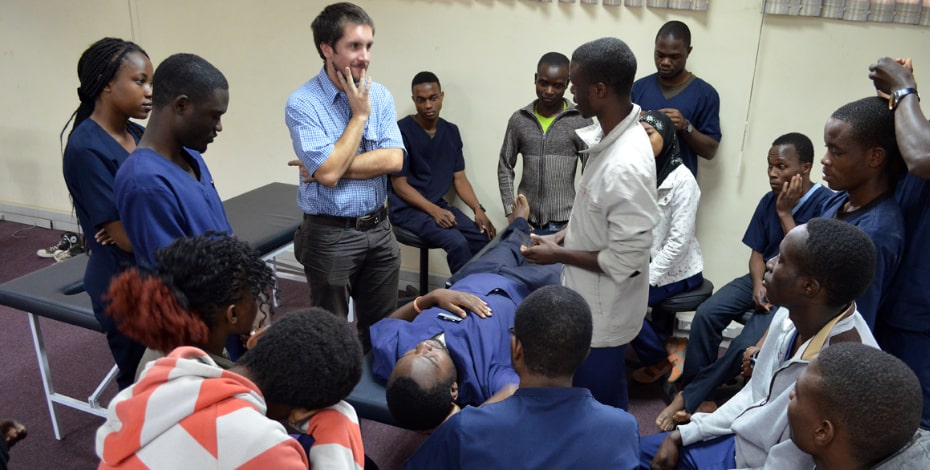
Making a difference, one physio at a time

Ben Gwilliam, APAM, asserts it’s great to think ‘I would love to go and volunteer my time overseas for even just a couple of weeks’, but it is difficult to make a lasting difference in the standards of healthcare long term.
‘It’s like a drop in the ocean. To truly make a difference, you need to train the people who live there, who speak the language and know the culture. If they can become well-trained physicians, and well-trained physiotherapists, that’s what is going to bring the standard of healthcare up,’ he says.
With a history of working overseas, in Mongolia and Malawi, Ben is passionate about making a real difference in the standards of healthcare in ‘low to middle income countries’. He asserts that a major problem with healthcare in low and middle income countries is the training of enough local, high-level healthcare practitioners who are able to provide high levels of care.
‘You need to train the people who live there,’ he says.
Ben worked at the University of Malawi with CURE (an American-based NGO, and a part of the Global Clubfoot Initiative). He was a member of a team that trained local healthcare professionals in the Ponsetti method of treating clubfoot, and the treatment and rehabilitation of other orthopaedic conditions.
CURE’s model of orthopaedic surgical care and rehabilitation is a little different than other organisations in that they ‘have their orthopaedic surgeon resident in the country and they run local orthopaedic training programs in partnership with medical training institutions in those countries.’
Ben explains that prior to his time in Malawi, the country had a shortage of doctors. ‘They couldn’t train enough doctors quickly enough to meet the need, and they couldn’t train enough rehabilitation workers to meet the need. So they implemented these short courses called clinical officer training
and rehabilitation technician training.’
This training takes two years, with clinical officers focusing on common illnesses and medical problems, and the rehabilitation technicians taught the basics of occupational therapy, physiotherapy and speech therapy. The thinking behind this was that they would have a qualification, valid only in Malawi, which would ease the shortage.
There is an organisation called Medic to Medic, which is a UK-based charity that sponsors students in the medical field through their studies. They sponsor students in different faculties of healthcare, not just medicine but also physiotherapy, pharmacy and nursing across a number of university campuses in Malawi, Uganda and Kenya.
Ben became aware of the organisation when working as a physiotherapy lecturer at the University of Malawi. Recently, a previous rehabilitation technician collegue of his, Sybil, decided to go on to further study in order to become a physiotherapist.
Sybil, like many students in Malawi, has a number of barriers to overcome in order to access further education. Without the assistance of Medic to Medic, Sybil and other students would not be able to complete their studies and gain the qualifications needed to begin making a difference.
Ben is planning on heading back to Mongolia in the near future to continue his work. If you would like to know more about Medic to Medic go to tinyurl.com/w8fu95r.
>> Ben Gwilliam graduated from the University of Sydney in 2009. He has worked in hospitals nationally and internationally in the development setting. He is the team leader of a private practice in NSW and is involved with international clubfoot education, cricket in Malawi, and charities like Medic to Medic.
© Copyright 2024 by Australian Physiotherapy Association. All rights reserved.





